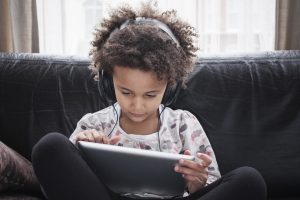Citizen Writes
Research hot topics
Child mental health
2021-05-09

By Professor Panos Vostanis
Worldwide, there is greater reliance on the digital infrastructure of society, and this has implications for mental health. Concerns about young people’s digital media use (social media especially) have become embedded in our thinking. For some, global statistics demonstrating rises in mental health conditions, are in part, explained by digital engagement. However, the relationship between digital media and mental health is far more complicated than the rhetoric suggests.
Advances in technology are juxtaposed with austerity measures, serious cuts to services, rises in unemployment, increased parental stress, greater emphasis on academic attainment and so forth. My colleagues and I, therefore, have repeatedly cautioned against simply accepting arguments that suggest a linear causal connection between digital and mental health. My research focuses on a ‘digital ethics of care’ which promotes children’s agency and autonomy in online spaces, and explores the relationship between mental health and digital media engagement.
The challenge of mental health and digital media has risen to the fore again as the world responds to COVID-19. Such public health challenges have inevitably led to increased screen time, greater reliance on internet-based services, and more engagement with online sources of information. With pauses on education, lockdowns, virus fears, parental stress, social distancing and decreased social contact, it is likely that children and young people are going to experience some mental health consequences. Mental health conditions are complex with a range of factors contributing, such as poverty, increased stress, disruption to routines, poor sleep, parental mental health, adverse experiences, trauma, and so on. These are all issues that are showing signs of increase during this current crisis. It is probable therefore that digital media might play an important role.
It is likely that we will see children or young people increasingly turn to the internet for information and support. The potential negative side of this, is that in so doing they may risk being exposed to detrimental material, fake news, websites that promote maladaptive behaviour and adults who are ready to take advantage of any vulnerability. However, the challenges these pose can be mitigated with strong supportive adults and peer networks and so there is much to be done by parents, teachers, and communities. There is a positive side to engaging with digital media, including, attending to education and schoolwork, socialising with peers, using creative tools, learning new skills, reducing social isolation, communicating with family, and engaging in activities that reduce stress and these aspects are starting to be more widely recognised.
It is also necessary to acknowledge that COVID-19 has highlighted considerable inequalities: socio-economic, employment, health, and social inequalities. I argue COVID-19 has also exposed digital inequalities that can be harmful to mental health. Large numbers of children and young people have not had access to basic digital equipment, internet, or online education support. The impact on the mental health of these young people will be greater as they no longer have access to their more traditional support systems. More needs to be done to level up against digital inequality and ensure that all children and young people can benefit from digital media, while being protected from any potential online harms.
Useful resources:
O’Reilly, M., Levine, D., and Law, E. (in press). Digital Ethics of Care Philosophy to Understand Adolescents’ sense of Responsibility on Social Media. Pastoral Care in Education DOI: 10.1080/02643944.2020.1774635
O’Reilly, M., Dogra, N., Levine, D., and Donoso, V. (in press). Digital media and child and adolescent mental health: A practical guide to understanding the evidence. London: Sage.